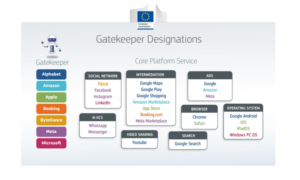“Hotels are going to attract customers with lower prices than Booking,” according to the FD. Sounds logical right? It wasn’t at first for a long time, but now it is. In fact, until previously, Booking prohibited hotels from offering a lower price on their own website. Following pressure from the European Commission (“Commission”), this requirement will be removed. This adjustment is one of the first required adjustments by very large online platforms as a result of the Digital Markets Act (“DMA”).
Nowadays, there are a number of very large online platforms that are so important that they can hardly be ignored by businesses and consumers. Examples include Alphabet (Google), Amazon, Apple, Booking, ByteDance (TikTok) Meta (Facebook) and Microsoft. To ensure fair competition, more choice for consumers and new opportunities for small and medium businesses, the DMA was created.
The DMA contains rules for these very large online platforms, also known as gatekeepers. These rules should ensure that consumers and businesses become less dependent on gatekeepers, can switch more easily to other companies and companies can compete fairly with these gatekeepers.
In the Netherlands, both the Commission, and the Authority Consumer & Market (“ACM“) enforce the DMA. Meanwhile, the first gatekeepers and associated core platform services have been designated by the Commission. A perfect time to see what the DMA can offer business users such as online sellers.
Who does the DMA apply to?
The DMA applies to gatekeepers in the provision of so-called core platform services. These core platform services include, for example, search engines, online marketplaces, app stores, online advertising and messaging.
The majority of the obligations only apply to gatekeepers once they and their core platform services have been designated as such by the Commission. The current designated gatekeepers are Alphabet (Google), Amazon, Apple, Booking, ByteDance (TikTok) Meta (Facebook) and Microsoft. Designated core platform services include Amazon Marketplace, Meta Marketplace, Google Shopping, Booking.com, Google Play and the App Store.

An up-to-date list of current designated gatekeepers and core platform services can be found here.
What can business users expect from gatekeepers?
Depending on the type of core platform service, different obligations apply to a gatekeeper. Noteworthy, the obligations do not always apply to business users such as online sellers, but also to advertisers and app developers, or sometimes only to consumers on, for example in respect to the use of personal data. For instance, Meta is obliged to allow users of WhatsApp and Messenger to communicate with third-party messaging applications based on an interoperability obligation. Below is a brief list of some key obligations and prohibitions on gatekeepers obligations that business users can hold the gatekeeper accountable for.
- Business users may offer products or services at more favourable prices or conditions on their own online sales channels or third-party platforms than on gatekeeper platforms.
In practice, this means that a business user using a core platform service such as Amazon, Meta Marketplace, or Google Shopping is free to apply more favourable prices or terms on its own online sales channel or on a third-party online platform such as Zalando.com or Omoda.nl.
As stated, Booking recently indicated it was changing its pricing policy, allowing hoteliers to charge lower prices on their own or third-party online sales channels than those they offer on Booking.
- Business users should be able to promote their offerings on the gatekeeper platform and enter into contracts with customers outside the online platform;
Business users can thus approach customers directly with their products and services to close a contract, regardless of whether those customers were acquired through the online platform.
Limiting this possibility is also known as steering rules or anti-steering. A well-known example is Apple’s conduct with regard to the App Store. On 24 June 2024, the Commission took the view that Apple violated this provision by preventing app developers from freely steering customers to alternative channels for offers and content. Among other things, business users were prevented to share price information within the app or inform customers about offers and promotions available on alternative online sales channels. In the Netherlands, the ACM already fined Apple in 2021 for abusing its dominant position by requiring developers to make payment processing through the In App Purchase system and prohibiting app developers from referring to a payment option outside the app within an app.
- Gatekeepers are prohibited to use non-public and data provided or generated by business users when using the online platform to compete with the business user;
The use of this kind of non-public data and data originating from business users often puts a gatekeeper at a competitive advantage compared to the business user. To prohibition to use this type of data should (re-)create a competitive level playing field.
In 2022 the Commission agreed to commitments by Amazon to stop its use of non-public data of its marketplace sellers. The Commission found that Amazon was using this non-public data from marketplace sellers in its retail decisions, thereby distorting fair competition on the platform.
- Gatekeepers may not rank their own products or services more favourably in search results (self-preferencing);
Many gatekeepers compete with business users on their own platforms. On these platforms such as Amazon Marketplace, Meta Marketplace and Google Shopping, consumers are offered a listing of products based on a search query. It is no longer permissible for providers of this type of designated core platform service to give their own products or services a better ranking position than similar third-party products. The way rankings are determined must also be transparent, fair and non-discriminatory. On this subject, see also our blog on self-preferencing.
- Business users are entitled to access its data generated during its activities and that of their (end) customers on the platform;
Gatekeepers generate a lot of data from business users and their (end) customers when they use Gatekeepers’ (core platform) services. This includes, for example, (personal) data collected when making an in-app payment or other entries on the online platform or in another connected service. The gatekeeper must provide the business user with free and effective access to that data. In doing so, this data must be accessible continuously and in real time.
Gatekeepers are required by the DMA to report to the Commission on their compliance with the DMA and the actions taken for this purpose in compliance reports. Non-confidential summaries of the compliance reports can be found on this webpage. Gatekeepers are required to update them at least once a year.
Which steps can be taken in case of non-compliance by gatekeepers?
From 7 March 2024, the obligations under the DMA will fully apply to first group of designated gatekeepers, namely Alphabet, Amazon, Apple, ByteDance, Meta, and Microsoft. Companies that believe the gatekeepers are not meeting their obligations have several options.
Companies can start by contacting the gatekeeper on its non-compliance with the DMA.
When gatekeepers fail to comply with their obligations, a (business) user can file a complaint with the Commission or the ACM. The Commission has the primary powers to investigate compliance with the DMA and enforce in case of non-compliance. The options are relatively informal, including an informal signal and a request for enforcement. In the Netherlands, the ACM is authorised to investigate possible violations of the DMA. It however reports non-compliance to the Commission, which can then take action against gatekeepers. The ACM itself can also enforce under national competition rules in some cases.
The Commission is also organising several compliance workshops for stakeholders in which they can comment on gatekeeper compliance measures. Meanwhile, the Commission has already launched several non-compliance investigations into Alphabet and Apple for steering rules in Google Play and the App Store respectively and Alphabet for self-preferencing on Google Search, among others.
To prevent reluctance of companies to file a complaint, the DMA further contains a prohibition on gatekeepers preventing or restricting companies from filing a complaint with the Commission or ACM or initiating proceedings in court.
How to profit from the DMA as business user?
Both the ACM and the Commission currently prioritize a level playing field and fair competition in digital markets. The DMA provides companies operating in digital markets and working with gatekeepers concrete tools to effectively raise unfair practices with enforcement authorities. The DMA also provides challengers to these gatekeepers with opportunities to compete more effectively. SOLV advises several companies on the potential of the DMA for their business operations. SOLV also advises companies on complaints against gatekeepers competing unfairly.
For further questions, please contact Kim van Haastrecht, Jelle van den Biggelaar or Berend van Unnik.




